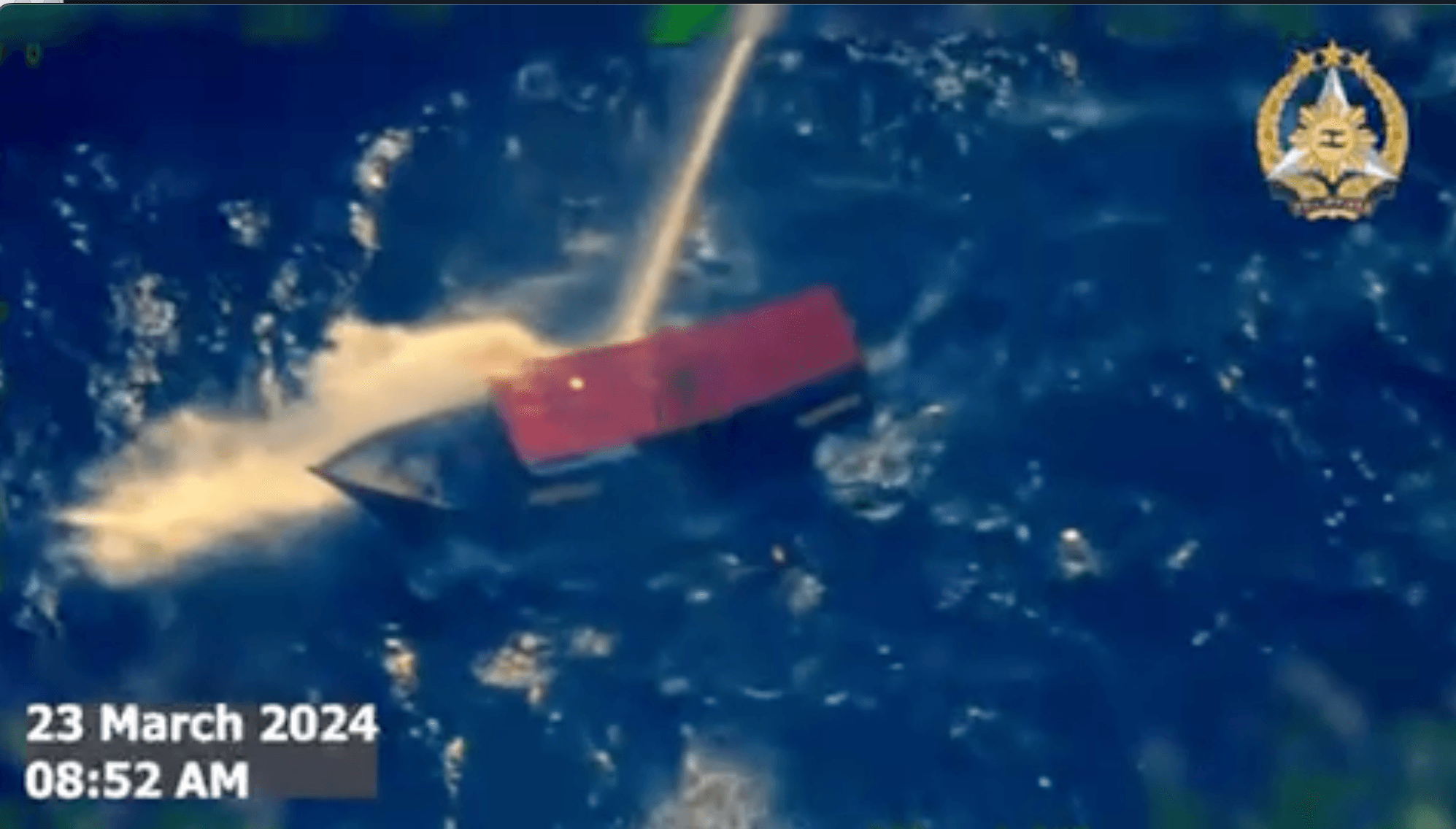SUMMARY
This is AI generated summarization, which may have errors. For context, always refer to the full article.

MANILA, Philippines – The Philippines on Monday, March 25, questioned if China was sincere in “lowering the tensions and promoting peace and stability in the South China Sea” as it protested yet another case of harassment by the China Coast Guard (CCG) and Chinese Maritime Militia (CMM) during a mission to bring soldiers and supplies to a military outpost in Ayungin Shoal.
“China’s aggressive actions call into question its sincerity in lowering the tensions and promoting peace and stability in the South China Sea. Even as the Philippines continues to engage China in dialogue and diplomacy at the bilateral and multilateral levels, China’s aggressive actions contradict and put to waste ASEAN-China efforts to promote practical activities to foster peace and cooperation in the region,” said Department of Foreign affairs spokesperson Teresita Daza, in a statement released to media.
On March 23, CCG and CMM ships harassed, shadowed, and used water cannons against Philippine ships on a mission to bring supplies and soldiers to the BRP Sierra Madre, a World War II ship purposefully run aground in 1999 to serve as an outpost in the area.
A wooden ship contracted by the military to bring supplies, the Unaizah May 4, was hit by the CCG’s water cannons as it tried to approach the shoal. Philippine officials said Navy personnel were also injured during the mission.
Manila summoned on Monday morning the Chinese embassy’s Charge d’affaires Zhou Zhiyong “to convey the Philippines’ strong protest against the aggressive actions undertaken by the China Coast Guard and Chinese Maritime Militia” during the March 23 mission.
The Philippines’ embassy in Beijing has been instructed to file the same protest before the Chinese Ministry of Foreign Affairs.
Follow international law
“In these demarches, the Philippines stressed, among others, that China has no right to be in Ayungin Shoal, a low-tide elevation that lies within the Philippines’ exclusive economic zone and continental shelf in accordance with the 1982 UNCLOS and as affirmed by the 2016 Arbitral Award,” said Daza.
UNCLOS is the United Nations Convention on the Law of the Sea, while the 2016 Arbitral Award is a ruling that stemmed from the Philippines taking China to court. According to the ruling, Beijing’s sweeping claim of the South China Sea, including parts of the West Philippine Sea, is invalid.
China has refused to recognize the ruling and has insisted that Ayungin Shoal or Second Thomas Shoal, a feature located just over 100 nautical miles off the coast of Palawan, is theirs.
“China’s continued interference with the Philippines’ routine and lawful activities in its own exclusive economic zone is unacceptable. It infringes upon the Philippines’ sovereign rights and jurisdiction.The Philippines demands that Chinese vessels leave the vicinity of Ayungin Shoal and the Philippine exclusive economic zone immediately,” said Daza.
The DFA spokesperson added: “The Philippines urges China to take the correct track of abiding by international law and respecting the legitimate rights of other states like the Philippines, and to cease and desist from its continued violation of international law, including the 1982 UNCLOS and the 2016 Arbitral Award.”
In a separate statement released also on Monday, the DFA said that aside from the summon in Manila and the demarche in Beijing, Undersecretary for Bilateral Relations and ASEAN Affairs Ma. Theresa P. Lazaro also spoke to Chinese Vice Foreign Minister Chen Xiaodong to relay Manila’s “strongest protest against the aggressive actions undertaken by the China Coast Guard and Chinese Maritime Militia” during the resupply mission.
According to the DFA, the Philippines has lodged 14 protests against China in 2024 alone as of March 25. Since Marcos came into power, the Philippines has lodged 147 protests or notes verbales against China.
During the March 23 mission, Philippine vessels – the Unaizah May 4 and the Philippine Coast Guard (PCG)’s BRP Cabra – were subjected to dangerous maneuvers and blocking attempts by Chinese ships. At one point, a CCG ship sailed in reverse in one attempt to block the Unaizah May 4.
While the wooden ship was unable to make it to the Sierra Madre itself, the Philippines was still able to bring soldiers and “essential supplies” to its makeshift outpost through rubber boats. This is the second time in March 2024 alone that China used water cannons in an attempt to stop the Philippines from its mission to Ayungin.
In early March, the Unaizah May 4’s windshield was shattered from the impact of two CCG water cannons.
Previous resupply missions have been just as fraught. Aside from dangerous maneuvers, shadowing, and water cannon use, collisions have occurred between China and the Philippines in the vicinity of Ayungin Shoal.
On March 23, hours after the mission, China’s foreign ministry told the Philippines that it “should be prepared to bear all potential consequences” if it “insists on going its own way” in the South China Sea. Foreign governments issued statements in support of the Philippines, calling out China for its “dangerous” behavior at sea.
Under the Marcos administration, Manila has taken a stronger stance on China’s encroachment of the West Philippine Sea. China has bristled over the government’s approach, berating both Manila and its allies – the United States, especially – of supposedly “stirring up trouble” in the South China Sea.
The March 23 resupply took place just days after Washington announced that US President Joe Biden would be hosting President Ferdinand Marcos Jr. and Japanese Prime Minister Fumio Kishida in the White House for the first-ever US-Japan-PH summit. – Rappler.com
1 comment
How does this make you feel?









![[Just Saying] SONA 2024: Some disturbing points](https://www.rappler.com/tachyon/2024/07/TL-marcos-sona-points-july-23-2024.jpg?resize=257%2C257&crop=335px%2C0px%2C720px%2C720px)


China’s true intent in dialogue and diplomacy at the bilateral and multilateral levels is just for show. But its dark intent is shown by its “aggressive actions.” Should the Philippine Government keep asking about China’s sincerity? Are not the latter’s actions enough to show its insincerity?